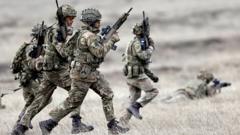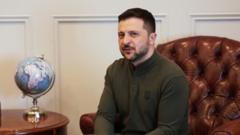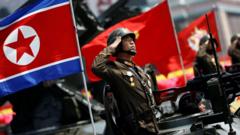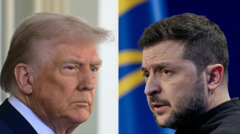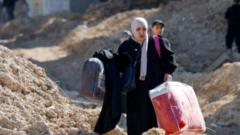As Russian forces close in on Pokrovsk, the grim reality of war unfolds with poignant stories of loss and bravery.
**Evacuation Efforts Amidst the Chaos: Life in the Front-line Town of Pokrovsk**
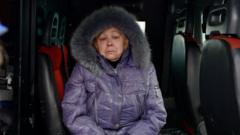
**Evacuation Efforts Amidst the Chaos: Life in the Front-line Town of Pokrovsk**
Desperate residents flee a city under siege as volunteer efforts continue to save lives.
In the dim light of dawn, Anton Yaremchuk gears up for yet another mission in the besieged city of Pokrovsk. The thick fog provides a brief respite from the watchful eyes of Russian drones, but for Anton and his colleague Pylyp, the threat remains omnipresent. His armoured van, while offering a level of protection, cannot shield them from the unpredictability of war.
Once a vibrant industrial hub, Pokrovsk has transformed into a stark battleground, with Russians now encroaching just two kilometers away. Anton recounts the harrowing conditions, stating, "Every day we come, it feels like hell." With the city's population dwindling to about 7,000 – predominantly the elderly who cling to their homes – he tirelessly works to evacuate civilians from impending danger.
Since the onset of conflict in February 2022, Anton has exited his creative pursuit in Berlin to co-found Base UA, a small aid organization dedicated to helping those trapped by turmoil. His team has successfully evacuated approximately 3,000 civilians, but with each trip, the risks mount. For many like Olga, 71, leaving her home of 65 years is wrenching. "It’s hard to leave everything behind...it’s not life anymore," she reflects, acknowledging the relentless shelling that has turned her life into a living nightmare.
As Anton drives through deserted streets, the remnants of normalcy can be seen, yet there is an undeniable eerie silence that hangs heavy in the air—a sensation exacerbated by constant explosions. The city, once deemed safe, is now losing critical resources, including a vital coal mine, leaving its future precarious.
Despite frequent attempts to persuade remaining residents to evacuate, many refuse. One elderly woman insists on staying near her deceased son's grave, while others avoid confrontation. "I promise you, street battles will escalate here," warns Anton, projecting a grim outlook for Pokrovsk.
With the situation deteriorating rapidly and evacuation efforts hampered by a recent drone attack, Anton's team is forced to halt operations. However, the Ukrainian police unit, the White Angels, continue their missions, albeit cautiously, as the few residents left face relentless bombardment.
The personal toll of war has struck Anton deeply, as he has witnessed tragedy after tragedy. He recalls, "Every time I see this, I break down," affirming the humanity behind the statistics. In a horrifying contrast to the political landscape, which is currently fraught with uncertainty, Anton embodies the spirit of resilience—focused on saving lives while grappling with the complexities of a protracted conflict.
As winter deepens in Ukraine, the stories of lives ravaged by war continue to unfold, surrounded by echoes of hope amidst despair.
Once a vibrant industrial hub, Pokrovsk has transformed into a stark battleground, with Russians now encroaching just two kilometers away. Anton recounts the harrowing conditions, stating, "Every day we come, it feels like hell." With the city's population dwindling to about 7,000 – predominantly the elderly who cling to their homes – he tirelessly works to evacuate civilians from impending danger.
Since the onset of conflict in February 2022, Anton has exited his creative pursuit in Berlin to co-found Base UA, a small aid organization dedicated to helping those trapped by turmoil. His team has successfully evacuated approximately 3,000 civilians, but with each trip, the risks mount. For many like Olga, 71, leaving her home of 65 years is wrenching. "It’s hard to leave everything behind...it’s not life anymore," she reflects, acknowledging the relentless shelling that has turned her life into a living nightmare.
As Anton drives through deserted streets, the remnants of normalcy can be seen, yet there is an undeniable eerie silence that hangs heavy in the air—a sensation exacerbated by constant explosions. The city, once deemed safe, is now losing critical resources, including a vital coal mine, leaving its future precarious.
Despite frequent attempts to persuade remaining residents to evacuate, many refuse. One elderly woman insists on staying near her deceased son's grave, while others avoid confrontation. "I promise you, street battles will escalate here," warns Anton, projecting a grim outlook for Pokrovsk.
With the situation deteriorating rapidly and evacuation efforts hampered by a recent drone attack, Anton's team is forced to halt operations. However, the Ukrainian police unit, the White Angels, continue their missions, albeit cautiously, as the few residents left face relentless bombardment.
The personal toll of war has struck Anton deeply, as he has witnessed tragedy after tragedy. He recalls, "Every time I see this, I break down," affirming the humanity behind the statistics. In a horrifying contrast to the political landscape, which is currently fraught with uncertainty, Anton embodies the spirit of resilience—focused on saving lives while grappling with the complexities of a protracted conflict.
As winter deepens in Ukraine, the stories of lives ravaged by war continue to unfold, surrounded by echoes of hope amidst despair.

